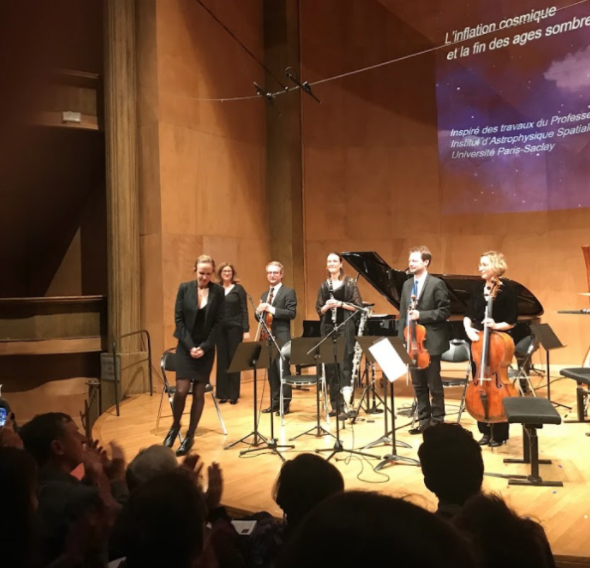
- This event has passed.
Museum of Science Boston & Institut Curie Paris present music of Alexandra du Bois
May 5, 2022@ 7:00 pm-8:00 pm
Event Navigation

Music of the Genome
IN-PERSON EVENT
Multiverse Concert Series presents an international collaboration with the Curie Institute of Paris in a groundbreaking live concert of music and science.
Within the nucleus of a cell, our DNA must fit into a space 200,000 smaller than in its unwrapped state. The shape of our DNA dictates the activity level of different genes, and failure to properly regulate these genes may cause diseases like cancer. Over the course of an evening, guest presenters from the Marie Curie Institute, as well as Harvard University and MIT, will share their recent research with an audience, interwoven with live chamber music directly inspired by the motions and rhythms of the living genome.
Institut Curie, France’s leading cancer center, combines an internationally renowned research center with a cutting-edge hospital group that treats all types of cancer, including the rarest. Founded in 1909 by Marie Curie, Institut Curie employs more than 3,700 researchers, physicians, and health professionals across three sites (Paris, Saint-Cloud, and Orsay), working on its three missions: treatment, research, and teaching. A private foundation with public utility status, Institut Curie is authorized to receive donations and legacies, and thanks to the support of its donors, is able to make discoveries more quickly, improving treatments and quality of life for patients.
Alexandra du Bois:
quintet: quiescence (2018)
for bass clarinet, piano, and strings
subject: When our cells sleep: Quiescence and Renaissance
Team Angela Taddei, Institut Curie, Paris, France
Commissioning six composers to write a piece based on a scientific discovery is the original project of Judith Miné-Hattab, a CNRS researcher at the Institut Curie. Each composer has written a work that reflects the beauty of a recent scientific discovery in astrophysics, biology and biophysics.
This concert is the result of a collaboration between these composers and researchers from the Institut Curie (Paris), the Institut d’Astrophysique Spatiale (Orsay), and the Massachusetts Institute of Technology (Boston). The project is supported by the University of Paris Sciences et Lettres and the Institut Curie.




